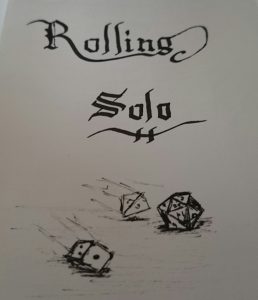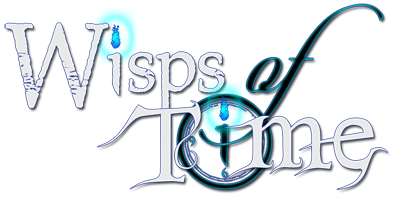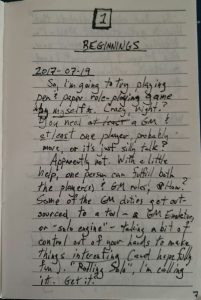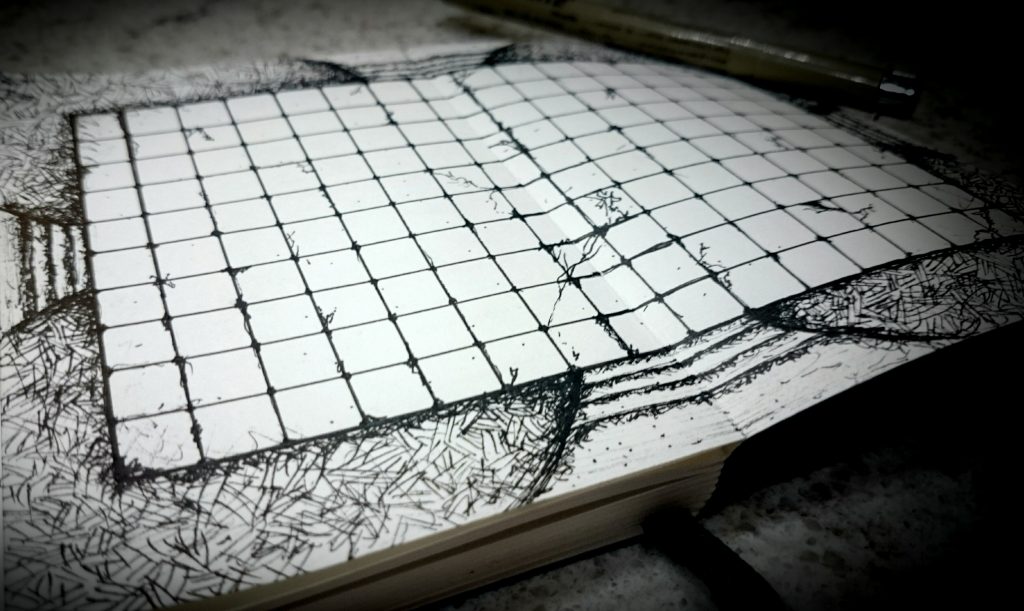So, I’m going to try playing a pen & paper role-playing game by myself. Crazy, right? You need a Game Master (GM) and at least one player — probably more, to make it interesting — don’t you? Otherwise, it’s silly talk?! Apparently not!
What is Solo Role-playing?

“Rolling Solo” was my first clever name for all this and the “title” page of my notebook, but apparently has some negative connotations in other arenas.
With a little help, one person can fulfill both the player(s)’s and GM’s roles for most any role-playing game! How is this possible?!, you ask. Some of your duties as GM simply get outsourced — to chance. You relinquish control of certain outcomes and the answers to certain questions, just as you would playing against a human GM. Or, an even better analogy, a computer or console RPG’s algorithms or artificial intelligence. That’s basically what it is: an artificial intelligence.
Using a set of guidelines or rules known as a “solo engine” or Game Master emulator, you introduce a random element to play which serves to make things rather interesting. Even though you’re playing alone, you don’t know what’s going to happen. It’s really quite thrilling, not unlike the cliffhanger at the end of the latest episode of <insert your favorite show here> that keeps you on edge all week til you can find out what happens in the next episode. Except, you still get your say in that next episode, to some degree — your reply (or rebuttal) to the demands of fate — to keep the story going where you want it to go. But, often that direction is somewhere you never could have imagined!
How Do You Play an RPG Solo?
So, how exactly do you do that? How do you get started? First, you’ll need to decide on a few things. A few of which I’m sure you already have in mind, a few you hadn’t considered, and the other parts you’re a little (or a lot) fuzzy on. The hardest part might actually be believing it’s possible, and then restraining yourself once you do begin to believe it.
What Do I Need?
A game. This can be as simple as using only your imagination to create a story you don’t know the ending to, or as extreme as a rules-heavy simulation game involving at least three published reference books, dozens of hand-painted miniatures, and the 3-dimensional scale representation of the beach at Normandy you painstakingly constructed out of Styrofoam and papier-mâché (or modeled and produced in your own 3D printer). Likely you’re somewhere in between and it’s totally up to you. Play the game you always wanted to play but no one else seemed interested in. Go out on a limb and try something new with no fear of commitment. Play with minis. Write a story. Scribble it down or make it beautiful. It’s limitless.
Obviously, you’ll need those minis, cards, dice, or whatever else your game’s rules dictate. Or not — feel free to bend or change those rules to your liking. You’re doing this for your own enjoyment and the sky’s the limit. The only thing I could advise against (in retrospect), is attempting to follow a published adventure intended for a GM for your first few sessions. While this is certainly possible and you will find systems and tips and guides for doing so, I can’t say it makes a good first experience for learning how to play solitaire. It’s too confined and limiting, even if you go “off script”. Do feel free to use a dungeon map or tiles or 3D variations thereof, but you might want to keep it simple and just go with a more narrative, free-form approach to witness the power of the soloing toolkit without other things getting in the way.
I personally began with a game I was already familiar with since I’d been playing it with my children, called Hero Kids. It’s aimed at 4 to 10 year-olds and is a classic fantasy RPG (there’s also a Sci Fi variant and a compatible Super Kids game) with simplified rules. You’ll find more information on Hero Kids and other kid-friendly RPGs elsewhere on this site.
A solo engine. At its simplest, this is your way to give up part(s) of the game to fate, the unknown element you must discover or experience. It may frustrate you, bore you, thrill you, or even shock you. It’s what makes it a game instead of simply going through the motions.
This can be as mundane as a coin flip to answer a Yes or No question. However, a more useful and interesting concept involves the standard 6-sided cube die and is commonly referred to as (and attributed to) Tiny Solitary Soldiers, though I first saw it employed reading John Yorio’s Tabletop Diversions blog (forgive me if I’ve got my sources incorrect I’ve been told the source of the d6 solo system is Freeform/Universal Role Playing Game, lovingly abbreviated as “FU”), though people have been inventing their own ways to play solo since role-playing games were first introduced. For these d6 systems, values on the die are assigned to Yes or No, usually in equal proportion, essentially allowing the same 50/50 outcome of the coin flip. However, the modifiers “and” and “but” can be applied to lend a degree of inflection to some of those Yes or No results.
Tiny Solitary Soldiers:
1-No and
2-No
3-No But
4-Yes But
5- Yes
6-Yes And“And” means even more than you expected, “But” means there is a limited effect or a drawback.
Tabletop Diversions:
1 = “No, and “ (Not only no, but extraordinarily so)
2 -3 = “No, but <something yes-like>”
4-5 = “Yes, but <something no-like>”
6 = “Yes, and “ (Not only yes, but extraordinarily so)
Now, there are all sorts of variations of this theme, so just choose one that makes sense to you and give it a try. so1um is another excellent and simple example, especially if you don’t already have a rules set in mind — it’s actually a one-page solo RPG.
Any of the above will serve as a good introductory solo engine, and in fact, many veteran solitaire players fall back on similar methods when they grow weary of more complex systems that require upkeep, such as the Mythic Game Master Emulator and its Chaos factor. Once you get a feel for the d6 roll, you can gradually throw in additional complexity: follow up roll(s) that further influence the nature of that Yes or No, taking the answer to your question in an unexpected direction (both so1um and Tiny Solitary Soldiers have rules for these). For example, certain rolls could trigger a random monster or introduce a new NPC.
Record-keeping. Finally, you’ll want to record all this down in some form or another, if for no other reason than to pick up where you left off after life’s interruptions get between you and your game. Keep a journal of long-form prose, a sheet of loose leaf paper with quickly jotted notes, type into Word or Google Docs, record on audio or video — it’s entirely up to you. Or not. You can certainly just play it out in the mind.
I personally keep a small pocket notebook, a Moleskine or the like (you can often find department store knock offs for much less that will work, depending on your tastes). I’m a proponent of the Bullet Journal style of note-keeping, but I more often burst out into narration than keeping short notes. Maps, drawings, brainstorms, mind maps, lists of things, and the occasional phone number or grocery list might also appear. I prefer dot grid paper, which unobtrusively allows for all of these things, but lined, graph, or blank paper will also do.
Other media to consider (some more involved than others): Pythia Oracle (solo RPG software), spreadsheets, RPGSolo.com, Scrivener (writing software with TONS of features), TiddlyWiki (wiki web software that will run directly from your file system), scrapbook, or any of the many blogging platforms out there (Blogger, WordPress, Tumblr, etc.).
That’s it! Well, not really. That’s only the tip of the iceberg, of course.There are a nearly infinite number of additional tools, tactics, techniques, frameworks, methods, products, and combinations thereof that are best left out for your first “tutorial” solo session.
I recommend casting all that aside this time ’round and stick with your game, your d6, and your notebook. Soloing takes a certain amount of “feel” for when to ask the engine questions, how to pose those questions, and how to interpret the answers to those questions in a meaningful or interesting way (I highly recommend reading “My first zombie play” for an excellent example). If you’re an experienced role-player or have a creative mind, you may already be a pro at all this — or you may have to reel yourself in and use the system more than feels natural. If you haven’t flexed your imagination muscles in a while, some practice may be required, but I do think you’ll quickly find your stride.
At risk of giving you too much information, I still want to mention a couple more integral ideas: logic and responsibility. You’re in total control when you’re soloing, so you can, of course, do whatever the heck you want. Asking off the wall questions, overpowering your characters to the point of triviality, or evening “railroading” your adventure are all entirely possible, but ill-advised. Sure, give all of that a try, take it to the extreme, aim for comedic effect, but you’ll find there’s not much fun in predictability nor omnipotent power. You have a responsibility to yourself to make the time you’re spending fun for you, so do what’s right to make that happen. This is where logic comes into play. In general, try to stick to a few important, meaningful questions, and interpret the outcome into terms of what would logically follow as a result. Fill in the details from your imagination, clarifying with follow-up questions if needed, but keep it all within reason and don’t slide the other direction, avoiding asking questions when you find yourself considering multiple possibilities of what could be. Stick with what’s logical — let the engine decide, guide, and surprise you.
What’s Next?
Take all these things into consideration, but ultimately this is about having fun on your own terms. Stay in this “tutorial mode” as long or as briefly as feels right. If you’re using a game you’re not familiar with, play this way til you’re comfortable with those rules before you add additional complications on the soloing side. Perhaps it all feels old hat right away and you only spend 20 minutes before you’re ready for more excitement? Step it up a notch and introduce complexity: follow-up rolls that further influence outcomes, try running 2 PCs instead of one, switch to a new game or solo engine you’ve been wanting to try, or use oracles and random generators to really throw yourself a curve ball. Not to sound like a broken record, but it’s up to you. Follow your own pace and just have fun.
I wrote the majority of the above to myself in my notebook while researching before I first tried a play session (now heavily annotated in-line). Typing it all out now, after having played a few solo sessions and moving on to more complex systems (Mythic GME), I feel like it’s sound advice, but I’m still new at this, too. I’ve been told one of the best ways to learn a subject is to teach it, so if I come across as authoritative, that’s my reasoning. But again, I’m a novice just as you may be, so read and experiment broadly and deeply and discover things in your own ways.
Next installment in this series, I’ll recount my first solo play session using only the above (a game, a d6 engine, and my notebook). I did, however, attempt to follow an adventure module my first time, which caused me to feel a bit confined and “railroaded” — the reason I advise against it early on, particularly if you’re in it for story instead of pure mechanics. I struggled to find balance between wanting to “beat” the adventure and stay within the bounds of its maps and GM notes while still following my imagination and the answers the dice gave me (all the while trying to avoid the spoilers). Despite that, I made it my own experience and it sufficed to learn the soloing ropes and I think will still serve as a good example of play for those new to soloing. So, stay tuned for that, or go ahead and dive in with your own first session. It’s definitely an experiential learning process, so go for it and don’t worry about following rules or making mistakes. Just relax and enjoy the ride!
Further Reading
These are some of the resources I used in my own learning:
- RPGSolo.com forums: My First Zombie Play – an excellent, entertaining example of using a soloing engine, random generators, when and how to ask questions, and how to respond to the answers.
- Die Heart: Getting Started with Solo Role-Playing and Solo Role-Playing Resources
- Tabletop Diversions: Solo Roleplaying Series: 1, 2, 3, 4, 5, “Bonus”, 6, 7
- Tiny Solitary Soldiers: Solo RPG?!
- Cabbage Games / SoloRoleplayer.com: The website seems to be gone, but the guy put most of his content up for free on DriveThruRPG. It’s a bit of redundant information between the guides, but definitely worth a read if you have the time.
Community
The Lone Wolf Roleplaying G+ Group is was the main community for solo role-players prior to April 2, 2019. After the fall of G+, things are a bit fractured, but there is a lot of crossover, so you can probably pick your preferred means of interacting with fellow soloists:
- The (Solo RPGs) Lone Wolf Roleplaying community on MeWe — a social network platform that saw a surge of gaming-related growth in the G+ exodus.
- /r/Solo_Roleplaying subreddit on Reddit
- Lone Wolf Roleplaying server on Discord









Comments are closed.